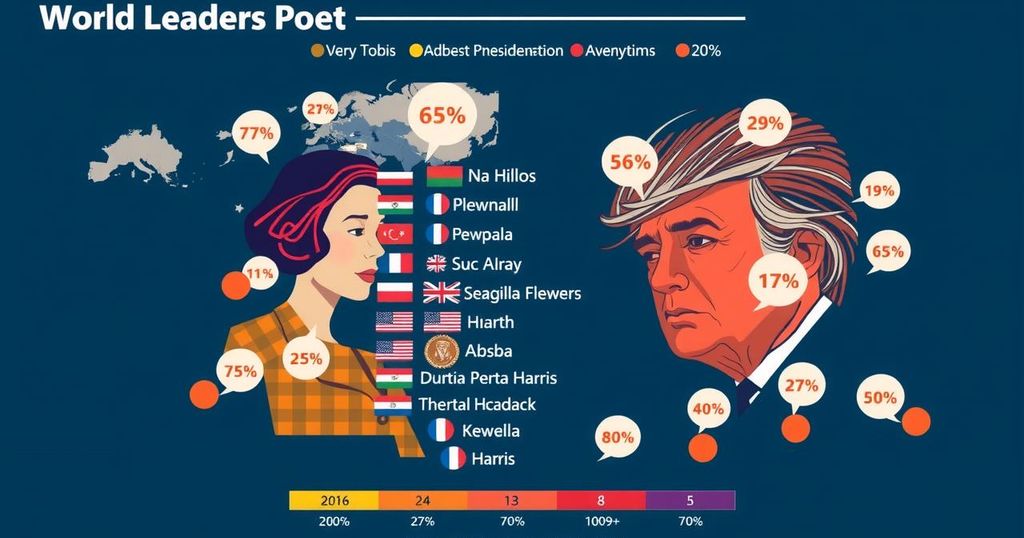As the U.S. presidential election approaches, world leaders scrutinize candidates Kamala Harris and Donald Trump, noting that both have distinct foreign policy visions. Leaders like Putin favor Trump for his perceived leniency towards Russia, while European leaders prefer Harris for her alignment with NATO values. India’s Modi remains neutral. The election’s outcome is expected to significantly impact international relations and global stability.
As the U.S. presidential election approaches on November 5, world leaders are closely observing the potential candidates: Democratic Vice President Kamala Harris and former Republican President Donald Trump. Polls indicate a highly competitive race with no clear frontrunner, yet the global implications of the election are significant due to America’s considerable influence on international affairs. Vladimir Putin, the President of Russia, appears to favor a Trump victory, partly because he perceives Trump as accommodating to Russia’s interests, particularly regarding military support to Ukraine. Experts suggest that Putin sees a likeness in Trump, identifying him as an authoritarian figure with whom he can relate. Notably, Putin has previously made favorable comments about Trump, positioning him as a potentially beneficial leader for Russia. Conversely, there is an acknowledgment among Russian analysts that U.S. attitudes towards Russia may remain negative regardless of the election outcome. In China, President Xi Jinping has not explicitly endorsed a candidate. Both parties in the U.S. have adopted a tough stance toward China; thus, it remains uncertain how either candidate would navigate U.S.-China relations. Despite Trump’s aggressive trade policies, he has claimed to maintain a good rapport with Xi, though behind the scenes, some Chinese officials may lean towards Harris, who is seen as more predictable. Benjamin Netanyahu, Prime Minister of Israel, has yet to endorse either candidate but is perceived to lean toward Trump due to their previous amicable relationship. Trump’s administration was characterized by strong support for Israel, making him a familiar figure for Netanyahu, whereas Biden has already committed significant military aid to Israel, particularly in the context of the ongoing conflict in Gaza. Among European leaders, there appears to be a stronger preference for Harris as she is perceived to uphold transatlantic relationships better than Trump, whom they view as threatening to NATO’s cohesion. Harris’s commitment to climate goals aligns more closely with European priorities compared to Trump’s policies favoring fossil fuel production. Regarding India’s Prime Minister Narendra Modi, he is seen as maintaining a neutral position, valuing bipartisan relationships conducive to India’s strategic interests in Washington. However, Trump’s past friendship may give him an edge in Modi’s sentiment, primarily concerning internal matters in India. In East Asia, leaders from South Korea, Japan, and Australia express varying concerns. South Korea’s current administration appreciates the Biden administration’s focus on security but is wary of an uncertain future if Trump prioritizes domestic agendas. Similarly, Japan anticipates potential disruptions in trade relationships under a Trump presidency. Australia faces economic dilemmas that could arise from Trump’s trade war with China, complicating bilateral ties. Ultimately, world leaders recognize the implications of the U.S. election for their nations and regional stability, with preferences leaning towards candidates who they believe will maintain stronger international alliances and stability.
The United States presidential election is not only pivotal for domestic policy but also has far-reaching implications for international relations. As major global powers observe the election, their preferences may influence diplomatic ties and strategic decisions. The candidates, Vice President Kamala Harris and former President Donald Trump, represent contrasting approaches to foreign policy, trade, climate change, and international alliances. Given the complex geopolitical landscape, understanding the leaders’ preferences sheds light on potential shifts in U.S. foreign relations following the election.
World leaders are paying close attention to the upcoming U.S. presidential election, with distinct preferences emerging for either Kamala Harris or Donald Trump based on perceived foreign policy implications. Leaders like Vladimir Putin favor Trump for his historically lenient approach to Russia, while European officials, including Germany’s Olaf Scholz, appear to support Harris, valuing her commitment to NATO and climate initiatives. Global leaders recognize the importance of the election, reflecting how it could shape their nations’ strategies and relationships with the United States.
Original Source: www.aljazeera.com






